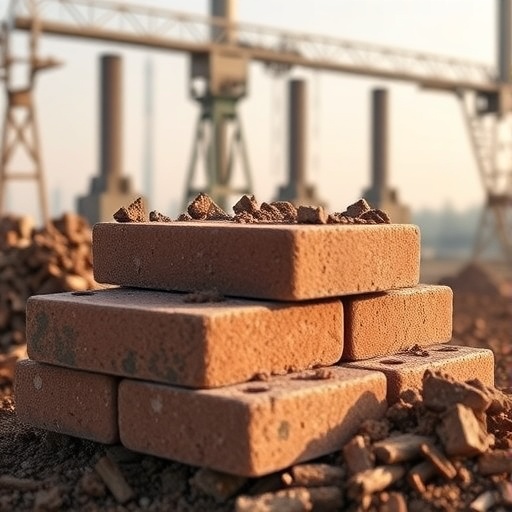In an era where sustainability is at the forefront of industrial advancement, the innovative utilization of waste materials is increasingly becoming a critical focal point of research and development. This is particularly evident in the recent findings by a group of researchers from Indonesia, who have explored the potential for transforming two industrial wastes into eco-friendly materials for brick-making. Their study delves into the effects of fly ash composition on the structural strength of bricks crafted from High-Pressure Acid Leach (HPAL) nickel limonite residue. This groundbreaking work not only addresses waste management issues but also contributes significantly to sustainable construction practices.
The research highlights the significant challenge posed by industrial waste, particularly in the context of Indonesia, where the rapid growth of industries has led to an accumulation of byproducts that often end up in landfills. The need for innovative solutions to manage these waste materials is becoming increasingly urgent. This study uniquely positions itself at the intersection of waste management and eco-friendly construction materials, showcasing how the right combination of waste streams can result in high-quality building materials.
One of the key components of the study is the examination of fly ash, a byproduct of coal combustion often generated by power plants. Fly ash contains a variety of minerals and has been recognized for its pozzolanic properties – which means it can react with lime in the presence of water to form compounds that contribute to the strength and durability of concrete and cement products. By integrating fly ash into the brick-making process, the researchers aimed to enhance the mechanical properties of the final product while simultaneously reducing the environmental impact of traditional brick manufacturing, which is often energy-intensive and contributes to greenhouse gas emissions.
The research team conducted a series of experiments that incorporated varying proportions of fly ash into the bricks made from HPAL nickel limonite residue. The findings indicate that the addition of fly ash not only improved the compressive strength of the bricks but also contributed to a reduction in shrinkage and cracking during the curing process. This dual benefit could lead to cost savings in construction projects, making these eco-friendly bricks an attractive alternative to conventional materials.
Moreover, the study’s implications extend beyond mere structural improvements. The successful integration of waste materials in brick production aligns perfectly with the principles of a circular economy, where products are designed for reusability and recycling, thus minimizing waste. By adopting such methodologies, industries can significantly decrease their environmental footprints while also fostering economic growth. This aspect is




